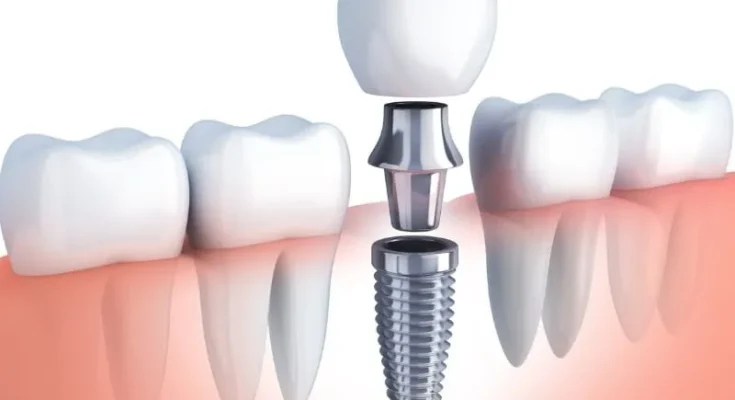A stunning grin can greatly increase your self-worth and confidence. However, missing teeth can create unsightly gaps that may affect your smile and overall oral health. Fortunately, dental implants provide a modern and effective solution to this problem. In this blog, we will explore how dental implants can restore your smile and improve your quality of life.
Understanding Dental Implants
Dental implants are artificial tooth roots made from titanium or zirconia that are surgically placed into the jawbone. Once the implant has fused with the bone, a dental crown, bridge, or denture is attached to it, creating a natural-looking and functional replacement for missing teeth. Dental implants are a popular choice for people seeking a permanent solution to tooth loss.
The Benefits of Dental Implants
Improved Appearance
Dental implants are made to feel and appear just like real teeth. They restore the aesthetics of your smile, filling in gaps and providing a seamless appearance.
Long-Lasting Solution
Dental implants can last a lifetime if properly maintained. They are a durable and long-lasting solution to tooth loss, providing you with a permanent and reliable option for restoring your smile.
Preservation of Jawbone
When you lose a tooth, the jawbone can begin to deteriorate due to a lack of stimulation. Dental implants stimulate the jawbone, preventing bone loss and preserving the natural shape of your face.
Improved Oral Health
Dental implants do not require the reduction of adjacent teeth, as is necessary with dental bridges. This enhances general oral health and maintains the integrity of your natural teeth.
The Dental Implant Procedure
There are multiple steps in the dental implant surgery, which include:
Consultation and Planning
Your dentist will conduct a thorough examination and take X-rays or CT scans to assess the condition of your jawbone and plan the placement of the implant.
Implant Placement
The jawbone is surgically opened to receive the dental implant. After the procedure, a healing period of several months is required for the implant to fuse with the bone.
Abutment Placement
Once the implant has integrated with the jawbone, an abutment is attached to the implant. The abutment serves as a connector between the implant and the replacement tooth.
Restoration
Finally, a dental crown, bridge, or denture is attached to the abutment, completing the restoration process.
Caring for Your Dental Implants
Once your dental implants have been placed and fully restored, it’s essential to take proper care of them to ensure their longevity. The following advice can help you maintain your dental implants:
Regular Dental Check-ups
Schedule regular dental check-ups and cleanings to ensure the health of your dental implants and overall oral health. Your dentist will monitor the condition of your implants and address any potential issues promptly.
Avoid Hard and Sticky Foods
Hard and sticky foods can damage your dental implants and the restoration. Steer clear of chewing on hard candies, ice, and other items. Be cautious with sticky foods like caramel and taffy.
Quit Smoking
Smoking can negatively affect the healing process and the long-term success of dental implants. If you smoke, consider quitting to improve your oral health and the longevity of your implants.
Protect Your Implants
If you grind your teeth or play contact sports, consider wearing a mouthguard to protect your dental implants from damage.
Avoid Alcohol and Caffeine during Healing
After the dental implant surgery, it’s crucial to avoid alcohol and caffeine as they can hinder the healing process. Alcohol can interfere with the body’s ability to heal, while caffeine can reduce blood flow to the surgical site, potentially delaying recovery.
Use an Antibacterial Mouthwash
Preventing infection at the implant site can be achieved by using an antimicrobial mouthwash. Your dentist may recommend a specific mouthwash to use during the healing process to ensure the area remains clean and free from harmful bacteria.
Be Mindful of Your Overall Health
The success of your dental implants can be greatly impacted by your general health. Conditions such as diabetes or autoimmune diseases can affect the healing process. Be sure to manage any health conditions and inform your dentist of your medical history.
Address Bruxism
If you have a habit of grinding or clenching your teeth (bruxism), it’s essential to address this issue as it can put extra stress on your dental implants. Your dentist may recommend a nightguard or other treatments to help manage bruxism.
Stay Hydrated and Maintain a Balanced Diet
Staying hydrated and maintaining a balanced diet is crucial for the healing process. Drinking plenty of water and consuming nutrient-rich foods can support your body’s ability to heal and ensure the success of your dental implants.
Avoid Using Toothpicks or Sharp Objects Around Implants
Using toothpicks or other sharp objects around your dental implants can cause damage to the implant and surrounding tissues. Instead, use a soft interdental brush or floss to clean around the implant.
Be Patient During the Healing Process
Following dental implant surgery, the recovery process may take several months. It’s important to be patient and give your body the time it needs to heal properly. Avoid putting pressure on the implant site and follow your dentist’s post-operative instructions carefully.
Consider Cosmetic Options for a Perfect Smile
In addition to dental implants, there are other cosmetic options available to enhance your smile further. Teeth whitening, veneers, and bonding are some of the procedures that can be combined with dental implants to achieve a perfect smile.
Educate Yourself on the Different Types of Dental Implants
Dental implants are offered in a variety of forms, such as small, regular, and All-on-4 implants. Each type has its advantages and disadvantages. It’s essential to educate yourself on the different options and discuss with your dentist which type is suitable for your specific needs.
The field of dental implantology is continually evolving, with new techniques and materials being developed to improve the success rate and longevity of dental implants. Stay informed on the latest advancements in dental implant technology and ask your dentist about any new options that may be available.
Conclusion
In conclusion, dental implants are a fantastic option for restoring missing teeth and achieving a beautiful, functional smile. By following the proper care and maintenance tips, you can ensure the longevity and success of your dental implants. Consult with your dentist to determine if dental implants are the right option for you and take the first step towards a gap-free, confident smile!








